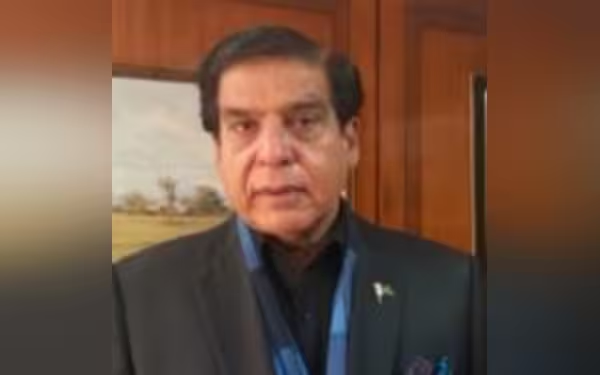Saturday, November 16, 2024 03:19 PM
Pervaiz Ashraf Criticizes PTI Leadership for Threatening Democracy in Pakistan
- PTI leadership labeled as enemy of democracy and peace.
- Ashraf emphasizes need for political unity and consensus.
- Historical contributions of PPP founder highlighted against PTI legacy.
 Image Credits: pakistantoday
Image Credits: pakistantodayPervaiz Ashraf criticizes PTI leadership, calling them enemies of democracy and urging political unity in Pakistan.
In recent political developments in Pakistan, the leadership of the Pakistan Tehreek-e-Insaf (PTI) has come under fire from senior Pakistan People’s Party (PPP) leader Raja Pervaiz Ashraf. During a session of the National Assembly, Ashraf did not hold back in his criticism, labeling the PTI leadership as 'the enemy of Pakistan’s interests, democracy, parliament, constitution, and peace.' This statement reflects the ongoing tensions between the two major political parties in the country, as they navigate a complex landscape of governance and public sentiment.
Raja Pervaiz Ashraf articulated his concerns about the PTI's approach to politics, stating, 'The leadership of PTI is an enemy of consensus, Pakistan, peace, and the interests of the people, as well as democracy, parliament, and the constitution.' His remarks suggest a belief that the PTI is not only undermining democratic values but also jeopardizing the stability of the nation. Ashraf pointed out that while a committee established by the National Assembly Speaker aims to foster a cooperative parliamentary environment, the PTI seems to be pursuing a different agenda altogether.
In his address, Ashraf also referenced a controversial tweet that had sparked debate, indicating that the individual behind it is against peace, democracy, and the supremacy of parliament. He asserted, 'No patriot would post such a tweet or humiliate the institutions of the country,' emphasizing the importance of respecting national institutions and their leaders. His comments highlight a growing concern among political leaders about the impact of social media on public discourse and national unity.
Furthermore, Ashraf took the opportunity to reflect on the historical contributions of his party's founder, Zulfikar Ali Bhutto, who is credited with granting Pakistan the right to vote and establishing a constitution. In contrast, he criticized the legacy of the opposition leader's grandfather, suggesting that he laid the groundwork for dictatorship in Pakistan. Ashraf's remarks serve as a reminder of the deep-rooted historical narratives that continue to shape contemporary political rivalries.
He praised former president Asif Ali Zardari for his role in restoring parliamentary powers through the 18th Amendment, which he believes was a significant step towards strengthening democracy in Pakistan. However, Ashraf did not shy away from warning that the path chosen by the PTI leadership could lead the country towards destruction. He called for unity and consensus among political factions to address the pressing issues facing ordinary citizens.
In closing, Raja Pervaiz Ashraf condemned the actions of PTI workers and leadership during the events of May 9, where attacks on defense installations occurred, leading to a national outcry. His statements reflect a broader concern for the well-being of the nation, urging all political parties to prioritize the interests of the country over their political ambitions. As Pakistan continues to grapple with various challenges, the call for unity and a focus on democratic principles remains more crucial than ever.













